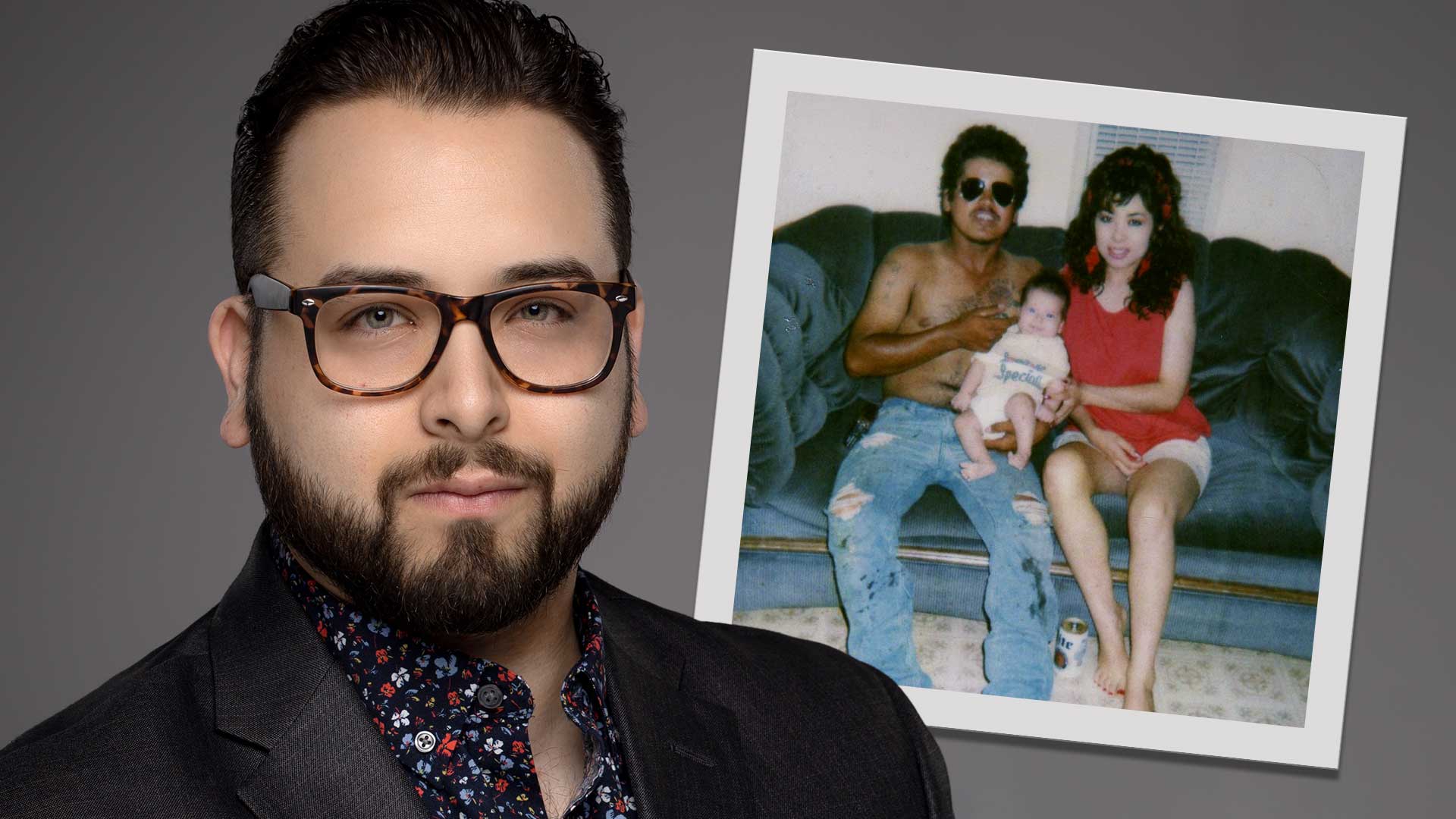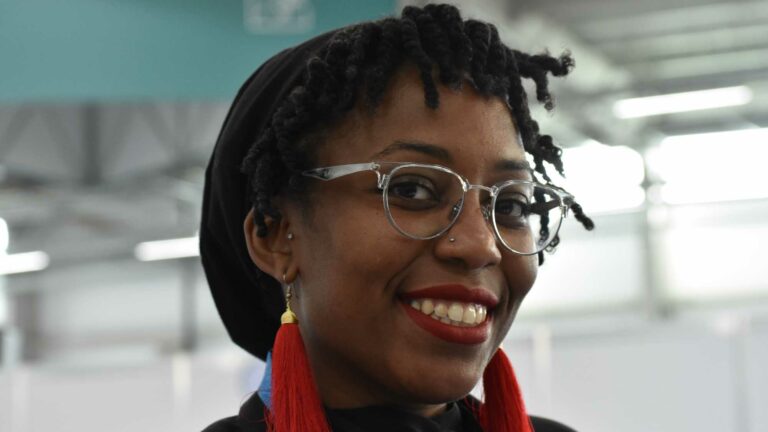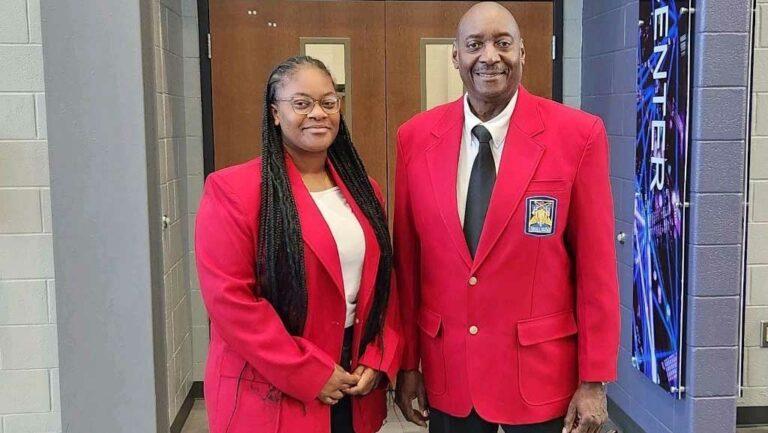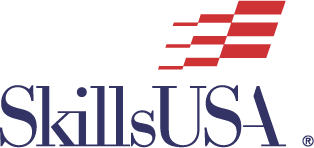When Manuel and Maria Robles crossed the border from Mexico into Texas, one-year-old son Aaron in tow, they were driven by the same passion that’s fueled countless similar journeys before and since: to secure a better future for their children.
“Juarez was a very violent place,” Aaron Robles — now 32— says of his birth city in Mexico. “The drug cartel was in charge of the police and the military. Just a very rough place to live.”
After making the journey to Texas, the family settled in El Paso, where they lived for the next few years. “At that point, not a lot seemed different,” Robles says, “because when you’re in a border town, everyone speaks Spanish. Everything is Spanish.”
The delayed culture shock hit when the family decided to uproot again, joining Robles’ uncle Ramon in Fort Wayne, Ind. “We didn’t know what we were getting into,” Robles laughs. “Never seen snow before. A lot less Latinos. At that point, it was my parents with two kids, my uncle and aunt with two kids, all in a small, one-bedroom house, just doing the best we could together.”
When his parents enrolled him in kindergarten, Robles was excited to make new friends … until he instinctively recognized a potential obstacle: He could barely speak English. Robles responded in a way that’s characterized his approach to life ever since: He identified what he wanted to do and figured out how to do it. “I became like a spy,” he says on his method of learning English. “My desire to make friends inspired me to just take it all in, and I learned in just a few months.”
Robles also learned the importance of a strong work ethic while watching his father support his family. “Whatever he had to do, construction, anything, he was out there doing it,” Robles says with admiration. “I remember one of the first jobs my parents had was delivering newspapers at four in the morning. They did a route together, and I’m there, five years old, in second-hand sweats with my baby brother. And for me, that was just cool. I never thought, ‘Oh, we’re immigrants.’ I was just living my life.”
Closed Doors, Open Windows
“My parents really encouraged me to assimilate to American culture,” Robles says. “The point was not to stand out.” The plan was going smoothly until Robles entered high school and his friends began landing jobs and driver’s permits. “I couldn’t get either one because I didn’t have documentation,” Robles says. “Up to this point, I hadn’t seen myself as different, because I did everything everyone else did.”
Always interested in art, Robles sought to fortify his now-shaky confidence in the future by enrolling in the graphic design program at Fort Wayne County Schools (FWCS) Career Academy. Once he met instructor and SkillsUSA advisor Karen Gillie, it was clear he’d made the right choice.
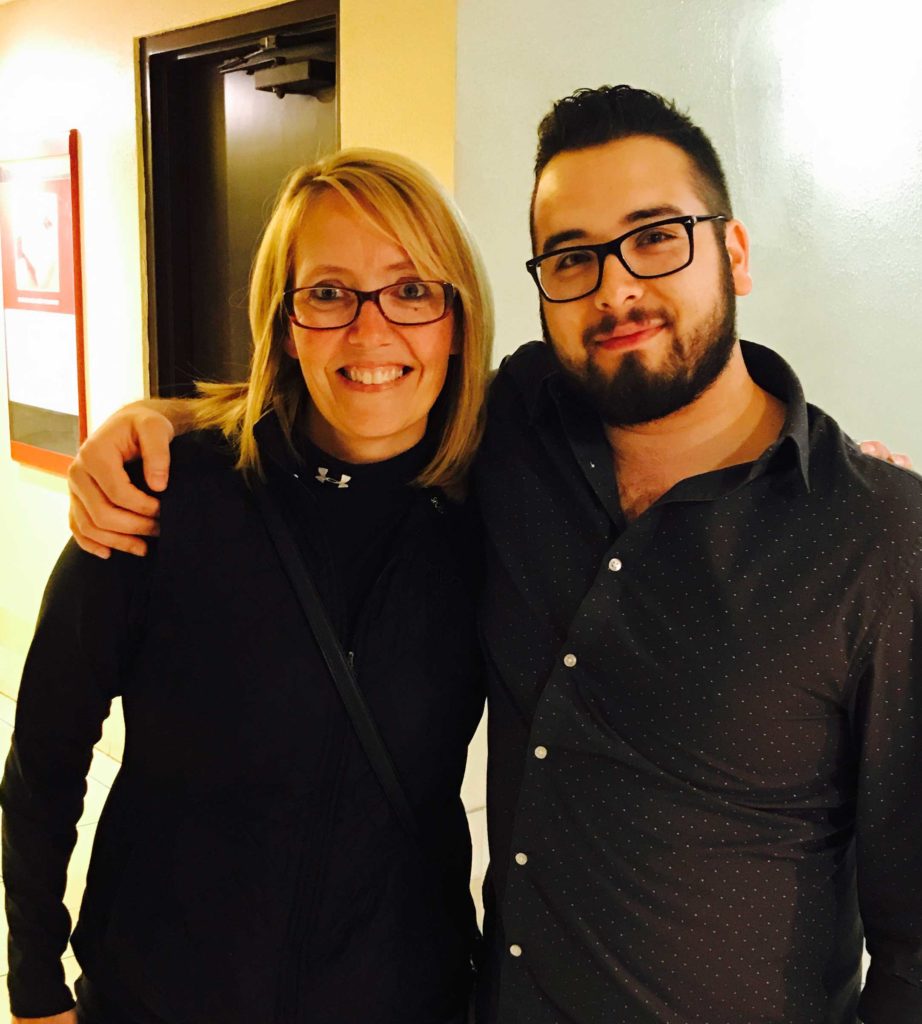
“Very quickly, she identified the potential I had,” Robles says. “And once she realized my other limitations [as a result of his immigration status], she took a special interest and didn’t let go. She’s my biggest mentor.”
“I knew from day one he would be successful in his life just by how he approached everything, from his classwork to SkillsUSA,” Gillie says. “He just jumped into it immediately, saying, ‘I’m all in.’”
The dynamic energy of Gillie’s class helped foster that student/teacher trust.
“It wasn’t just learning design,” Robles explains. “She brought in business owners from the community to present to us and give us projects. They’d say, ‘We need a business card, here’s the scope of work, we’re coming back in two weeks, and you guys are going to present your work to us and we’ll pick a winner.’ That made it real.”
Robles’ skills developed so quickly that he helped his team win gold in the Promotional Bulletin Board competition at the SkillsUSA Indiana State Leadership & Skills Conference in 2008. The win earned his team the right to compete nationally at the SkillsUSA Championships in Kansas City, Mo., part of SkillsUSA’s annual National Leadership & Skills Conference (NLSC).
While the chapter didn’t medal, the experience — which included Robles’ first-ever flight — was its own reward. “The event center was a few square blocks of just massive amounts of people from all over the place,” Robles recalls, excitement still in his voice. “As a young Latino immigrant, it was a very small group of us who were exposed to something we’d never been exposed to.”
“Sometimes when students are inside your four walls, it’s harder for them to get a vision of the skills they’re gaining,” Gillie says. “SkillsUSA gives them a chance to see their value.”
As a senior, Robles was eager to gain more value from Gillie’s class, and the instructor did not disappoint. “We went from learning the skill set to how to leverage it as a business,” Robles says. “How do you build clients? What are the expectations? I just got really good at that.”
Robles was also honing his leadership skills as president of his SkillsUSA and National Technical Honor Society (NTHS) chapters. As part of his dual presidential duties, Robles was required to give a commencement speech. “It was the first speech I ever gave,” he recalls. “It was all of the kids graduating. It was all the parents who came in. And I just remember that was the first time people came up to me and said, ‘That was an incredible speech. You are really good at this.’”
By the time he graduated, Robles was good at a lot of things. “I had dual college credits, I had certification in all of the software I used, I had a portfolio from real clients from the community. That’s a very powerful thing to leverage at that age.”
It seemed to be raining good news when Robles learned he’d won a two-year scholarship to the University of Saint Francis, one of the top private art schools in the area. “The tuition was super-expensive,” Robles says, “something we could’ve never afforded without those scholarships. At this point, I got high ambitions. I know what I want to do. I’m good at what I do. I know it. There’s a confidence within me that is now alive and growing.”
Two years as a SkillsUSA member had brought so many positive changes to Robles’ life, but he was about to face a painful reminder that one thing hadn’t changed: his immigration status.
Courage on the Brink
Because the scholarship he’d earned was part of a federally funded program, Robles learned upon meeting with school faculty — who’d been excited to welcome him aboard — that he was not eligible to receive it. Alan Nauts, chair of the school’s graphic design department, spearheaded efforts to raise private funds to help offset costs. While those efforts were deeply appreciated, they weren’t enough.
“You can imagine how that feels to be an 18-year-old who can’t drive, can’t work, now can’t go to college and can’t move out,” Robles says. “I went into a depression. ‘What is all this work for if it’s not recognized?’”
Eventually lifting himself from the brink of despair, Robles did what he’s always done: He assessed the situation and pushed forward, earning money sporadically as a freelancer and enrolling at Ivy Tech Community College. Those initial college courses helped him fully understand just how special his time in Gillie’s program had been. “All the things they were teaching me in college I already knew from high school,” he says. “We’re doing ‘Intro to Photoshop.’ Come on, man, I don’t have time for this.”
That frustration sparked a renewed commitment to find a steady job, and Robles was finally able to secure one at a local retail store. He started “cutting boxes in the back and cleaning up,” but when he noticed that the company needed help with graphic design (there’s that “spy” again), he made a move … and his bosses gave him an opportunity.
Soon, Robles was offered a full-time position managing the company’s advertisers, one that a full-time college schedule could not accommodate.
“At this point, I’m paying out of pocket [for school] and learning things I already knew to do the things that I’m already doing,” he says. “Do I keep doing that or take this opportunity to learn a whole new skill set while I’m getting paid and follow this career?”
It was the kind of choice that called for a mentor’s advice.
“Take the job,” Karen Gillie said.
That advice was echoed by Erin Salyers, chair of Ivy Tech’s Visual Communications program.
“I am so grateful that, as educators, they took my interest to heart rather than say the expected ‘Finish college,’” Robles says. “They knew me and my work ethic and knew I was going to excel. That’s where I had the biggest growth spurt of my career, because I went from being a graphic designer to someone who learned how to build websites, social media management and so many other things.”
“I dropped out of college and not one person ever asked me about my degree. They wanted to see the work I was doing. They wanted to know the experience. I’m 32. I own several companies and I have zero debt. There are so many opportunities for kids to explore careers they are interested in without diving right into college.”
Aaron Robles
Permission to Keep Dreaming
More opportunities for growth would come in 2012 when President Barack Obama signed the Deferred Action for Childhood Arrivals (DACA) policy into law. “It allowed me permission to be in the U.S. legally,” Robles explains, “allowed me to get a work permit and a driver’s license. It unlocked a lot of opportunities to do things legitimately that, up until that time, I’d been doing under the radar. So now I’m like, ‘Cool. Let’s go exploring other options.’”
Robles had been grinding under the weight of his immigration status for so long that, once many of those barriers were removed, he was ready to fly. Those skies weren’t always turbulence-free, though. He gained and lost jobs, started businesses that didn’t quite work out, and occasionally got stuck in that “one-step-forward, two-steps-back” rut that sometimes ensnares everyone.
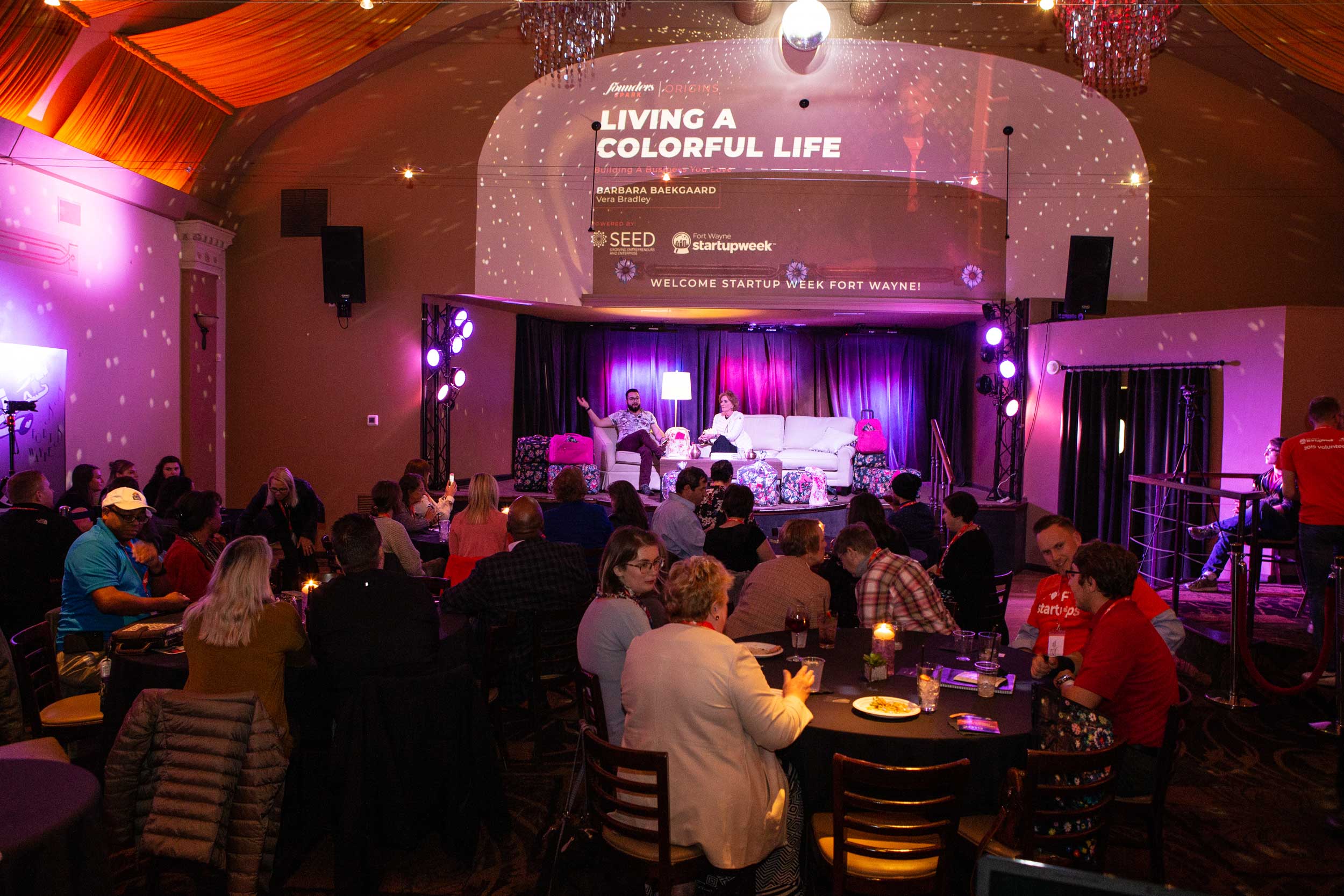
Still, Robles picked up new skills and life lessons with every step — and misstep — along the way. Today, he owns and operates two companies: “Hyprnova,” which specializes in graphic design, and “Founders Spark,” created to help aspiring entrepreneurs connect with strong mentors.
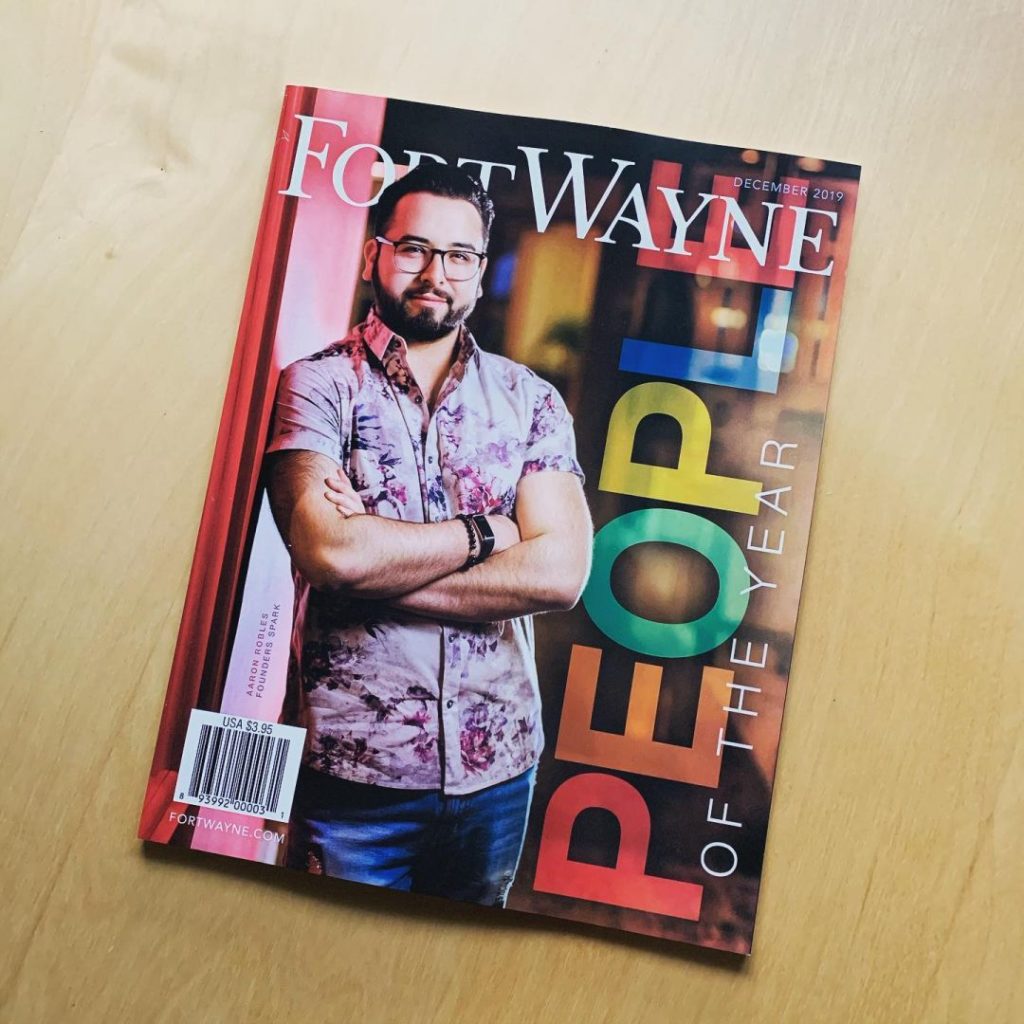
“Founders Spark was created by looking back on my career and how so many people mentored and encouraged me along the way,” Robles explains. “I wanted to give that back.”
Through Founders Spark, Robles has hosted networking events with founders of multi-million-dollar businesses, created online educational resources and even developed a training course to help teenagers learn to run their own businesses. His efforts earned him a nod as one of Fort Wayne’s “Top Ten People of the Year” in 2019.
At an age when many are still in the “early years” of their profession, Robles has already packed a lifetime’s worth of experience and knowledge into his still-unfolding career.
“I dropped out of college and not one person ever asked me about my degree,” he says. “They wanted to see the work I was doing. They wanted to know the experience. I’m 32. I own several companies and I have zero debt. There are so many opportunities for kids to explore careers they are interested in without diving right into college.”
As it always does, the future will surely bring more ups and downs, but Robles has the skill set to handle them both, the one he began building in SkillsUSA.
“I can’t tell you where I would have been if it wasn’t for a Karen Gillie, if it wasn’t for a SkillsUSA,” he says. “I’ve learned from my own experience that when you give kids the responsibility of doing something, they will show up 90% of the time. The problem is, we don’t put them in places where they can exercise that responsibility. I was put in those places in SkillsUSA.”
“I just pointed him in the right direction,” Gillie responds. “He needs to look in the mirror. It was within him the whole time.”
Hear more from Aaron Robles in person at the Opening Session of SkillsUSA’s National Leadership & Skills Conference this June!


